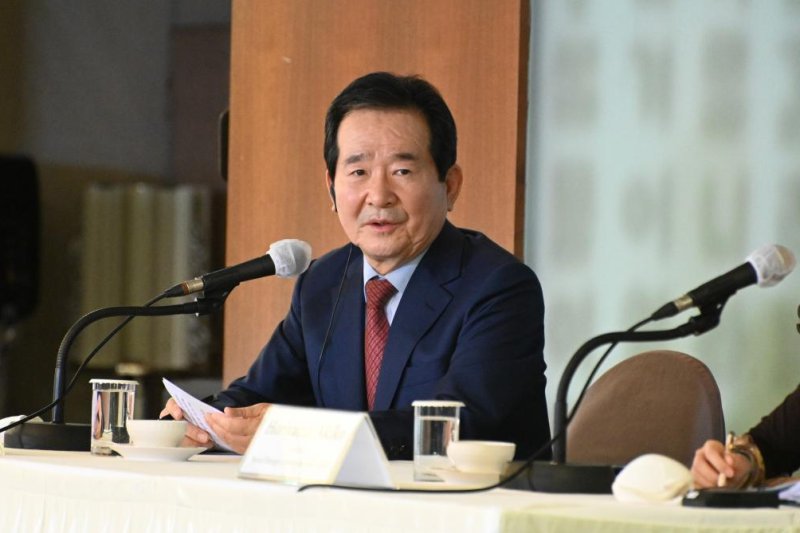South Korean Prime Minister Chung Se-kyun told foreign reporters on Friday that the country was still facing a long fight ahead with COVID-19. Photo by Thomas Maresca/UPI
SEOUL, March 27 (UPI) -- While South Korea has managed to stabilize the spread of COVID-19, Prime Minister Chung Se-kyun warned against complacency on Friday, saying the country was still preparing for a "long-term battle" with the disease.
"[T]his is no time to be complacent," he told a group of foreign reporters at a briefing in Seoul. "The fight against this novel virus might be much longer than we assume. Therefore, we're also preparing for a long-term battle with COVID-19."
South Korea reported 91 new COVID-19 patients on Friday, bringing the country's total to 9,332 cases. The number of recovered patients rose by 384 to a total of 4,528, while deaths rose by 8 to 139.
Around 84 percent of cases are concentrated in the southeastern city of Daegu and neighboring North Gyeongsang Province, according to the Korea Centers for Disease Control and Prevention, with over half of all cases connected to a secretive religious sect that was at the heart of the country's outbreak.
The prime minister, who heads the Central Disaster and Safety Countermeasures Headquarters, said South Korea's approach to fighting the novel coronavirus has relied on "speed, transparency, innovation and voluntary civic participation."
The country, which announced its first confirmed COVID-19 case on Jan. 20, around the same time as the United States, took an early and aggressive approach to testing, quickly ramping up its capacity to over 10,000 tests per day.
South Korea has relied on its technology infrastructure to trace the contacts of anyone testing positive, tracking their movements via mobile phone GPS, credit card transactions and CCTV, while rolling out innovative testing approaches such as drive-through centers.
Lockdowns like those in China and Italy have also been avoided, as citizens widely responded to government instructions for self-quarantine measures, social distancing and wearing face masks in public.
However, as life begins to regain a sense of normalcy in many South Korean cities and warmer weather arrives, the prime minister expressed concern that people would start to ease up on safety measures.
"Complacency is what I'm worried about," Chung said. "With spring here and flowers blooming, people may not want to continue social distancing. We need to continue to encourage people to share the burden together. It's better to have intensive pain for a short time than extended pain for a long time."
Health officials are turning their focus to growing numbers of cases imported by travelers from overseas, which grew by 13 on Friday to reach 144. Unlike many countries, South Korea has not imposed stringent entry bans, only barring travelers from Hubei Province in China, where the outbreak began, while screening others from high-incidence countries.
In recent days, however, South Korea has begun tightening entry controls in order to combat the spread of imported cases. Over the weekend, the country started imposing automatic testing and a 14-day quarantine period for arrivals from Europe. And on Friday, it began enforcing 14-day quarantines on South Korean nationals and long-term stay visitors coming from the United States.
The country is also facing the economic fallout of the coronavirus, with small businesses and industries such as travel, hospitality and entertainment being battered and financial markets plunging.
Chung said the government was "desperate" for the economy to reopen "sooner rather than later," but cautioned that the coronavirus spread has still not been contained.
"We were able to extinguish the major fire but we are still dealing with residual ashes," he said.
On Tuesday, South Korea doubled an economic stimulus package to $80 billion to help stabilize businesses and markets.
"For the last two months, Korean people have suffered greatly, especially small business owners and the self-employed and they are still struggling," Chung said. "Our top priority is still on the coronavirus but we are taking special measures to help them."















